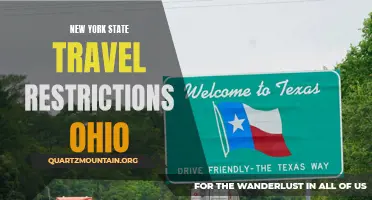
After more than a year of travel restrictions and lockdowns, it seems that the end is finally in sight. Countries around the world are starting to ease their travel restrictions, allowing people to explore new places and reunite with loved ones. This long-awaited news brings a sense of excitement and hope, as it signifies a return to normalcy and the opportunity to once again experience the joy of travel. As the world slowly reopens, we can't help but imagine all the adventures that await us, the new cultures we'll discover, and the memories we'll create. The end of travel restrictions marks a turning point, reminding us that there is light at the end of the tunnel and that the world is ready to be explored once more.
What You'll Learn
- When will travel restrictions come to an end?
- What factors are being considered before lifting travel restrictions?
- Will the end of travel restrictions be gradual or sudden?
- How will the end of travel restrictions affect the tourism industry?
- Are there any specific guidelines or regulations that will be put in place after travel restrictions are lifted?

When will travel restrictions come to an end?

Travel restrictions have been put in place in many countries around the world as a response to the COVID-19 pandemic. These restrictions have severely impacted the tourism and travel industry, leading to canceled flights, closed borders, and economic downturns. As the world continues to grapple with the ongoing effects of the pandemic, many are wondering when these travel restrictions will finally come to an end.
The duration of travel restrictions varies from country to country and is dependent on several factors, including the severity of the pandemic in each region, the success of vaccination efforts, and the implementation of effective containment strategies. Some countries have already started easing travel restrictions as they reach higher vaccination rates and see a decline in COVID-19 cases. For example, the European Union has recently introduced a digital COVID-19 certificate, allowing for easier travel within member countries for those who are fully vaccinated, recovered from the virus, or have a negative test result.
However, it is important to note that the lifting of travel restrictions is not a uniform process and is subject to change based on the evolving situation. New variants of the virus, such as the Delta variant, have led to renewed concerns and the reimplementation of certain restrictions in some regions. Additionally, the global nature of travel means that countries must also consider the situation in other parts of the world before fully opening their borders.
Experts suggest that the timeline for the end of travel restrictions will likely vary depending on the region and the progress of vaccination campaigns. Countries with high vaccination rates and effective containment strategies are more likely to lift restrictions sooner than those with lower vaccination rates and ongoing outbreaks. The global community is working towards achieving herd immunity through widespread vaccination, which will be a crucial step in allowing for the safe resumption of travel.
In the meantime, governments and health authorities continue to monitor the situation closely and update travel guidelines accordingly. It is important for travelers to stay informed about travel restrictions and guidelines before planning any trips. This includes checking for updates on entry requirements, quarantine protocols, and any other measures in place to ensure the safety of both travelers and the local population.
Ultimately, the end of travel restrictions will depend on various factors, including the global progress in vaccination efforts, the control of new variants, and the improvement of testing and contact tracing capabilities. While it may be difficult to predict an exact timeline, it is hopeful that with continued efforts and cooperation, travel restrictions will gradually be lifted, allowing for the revitalization of the tourism and travel industry. Until then, it is important for everyone to follow public health guidelines and stay informed about the latest developments to ensure the safe and responsible resumption of travel.
Exploring Kenya: Are There Any Travel Restrictions in Place?
You may want to see also

What factors are being considered before lifting travel restrictions?

As the world gradually emerges from the grip of the COVID-19 pandemic, one of the key questions on everyone's mind is when will travel restrictions be lifted? Governments around the world imposed travel restrictions to curb the spread of the virus, but as vaccination rates increase and cases decrease, there is growing optimism that international travel can resume.
However, before completely lifting travel restrictions, several factors need to be considered to ensure the safety and well-being of travelers and the local population. These factors can vary from country to country, but some common considerations include:
- Vaccination rates: Vaccination is one of the most effective tools in controlling the spread of COVID-19. Before lifting travel restrictions, governments closely monitor vaccination rates, both domestically and internationally. They often require a certain percentage of the population to be fully vaccinated and may also require travelers to be vaccinated before entering the country.
- Infection rates: Governments closely monitor the number of COVID-19 cases in their own country and in the countries they are considering lifting travel restrictions for. If the infection rates are low and under control, it gives them the confidence to ease travel restrictions. However, if there is an outbreak or a surge in cases, travel restrictions may need to be extended or reintroduced.
- Variants of concern: The emergence of new variants of the virus, such as the Delta variant, has raised concerns among health authorities. Governments consider the prevalence of these variants in different countries and their potential impact on the spread of the virus. If a country has a high number of cases with variants of concern, travel restrictions may be kept in place or reinforced.
- Health infrastructure: The capacity of a country's health infrastructure to handle any potential surge in cases is another important factor. Governments evaluate the availability of hospital beds, medical equipment, and healthcare workers to ensure they can effectively respond to any increase in cases resulting from the lifting of travel restrictions.
- Travel protocols: Governments also consider the implementation of travel protocols, such as testing requirements, quarantine measures, and contact tracing capabilities. These protocols help mitigate the risk of importing or exporting COVID-19 cases and allow for efficient monitoring of travelers.
- Reciprocity: Many countries consider the principle of reciprocity when it comes to lifting travel restrictions. They may require countries to have similar vaccination rates or relaxed travel restrictions for their own citizens before reciprocating the same for travelers from those countries. This approach ensures a balanced and fair approach to reopening travel.
It is important to note that the lifting of travel restrictions is a complex decision that requires careful consideration of multiple factors. Governments prioritize the health and safety of their citizens and aim to strike a balance between reopening borders and minimizing the risk of a resurgence in cases. As vaccination rates increase and COVID-19 cases decrease, countries will continue to evaluate these factors to determine the right time to lift travel restrictions and restore international travel.
Caribbean Airlines Travel Restrictions: What You Need to Know Before You Fly
You may want to see also

Will the end of travel restrictions be gradual or sudden?

As the world continues to grapple with the ongoing COVID-19 pandemic, travel restrictions have become a common practice to control the spread of the virus. However, with vaccines being distributed and infection rates gradually decreasing in many countries, there is a growing anticipation about when travel restrictions will finally come to an end. The question that arises is whether the end of these restrictions will be gradual or sudden.
The answer to this question is not straightforward and can vary depending on a multitude of factors. Firstly, it is important to note that different countries and regions have implemented their own travel restrictions based on their individual circumstances. Therefore, the lifting of these restrictions is likely to occur in a fragmented manner, with each country having its own timeline and approach.
Another factor that will influence the gradual or sudden end to travel restrictions is the progress made in controlling the spread of the virus. As vaccination rates increase and infection rates decrease, governments may feel more confident in gradually easing travel restrictions. This could involve implementing certain criteria such as vaccination certificates or negative COVID-19 test results for travelers, as a way to ensure the safety of their citizens and prevent a resurgence of the virus.
Moreover, the end of travel restrictions may also be influenced by the availability and efficacy of vaccines. If vaccines prove to be highly effective in preventing the transmission of the virus and reducing severe illness, governments may feel more inclined to lift restrictions sooner rather than later. However, if new variants of the virus emerge that are resistant to existing vaccines, travel restrictions may need to be reinstated or maintained until alternative solutions are found.
Additionally, the economic impact of travel restrictions will also play a role in determining whether the end of these restrictions will be gradual or sudden. The travel and tourism industry has been severely affected by the pandemic, with many businesses struggling to survive. Governments may therefore be under pressure to lift restrictions as soon as it is deemed safe, in order to revive the industry and stimulate economic recovery.
In conclusion, the end of travel restrictions is likely to be a complex and multifaceted process that will differ from country to country. Factors such as the control of the virus, the availability and efficacy of vaccines, and economic considerations will all contribute to whether the end of travel restrictions will be gradual or sudden. It is important for governments to strike a balance between public health and economic recovery, while also considering the global nature of the pandemic and the interconnectedness of travel.
Understanding the Latest Travel Restrictions for US Citizens Traveling to Canada
You may want to see also

How will the end of travel restrictions affect the tourism industry?

The COVID-19 pandemic has had a major impact on the tourism industry around the world. With travel restrictions in place for the past year, many countries have seen a significant decline in tourism and the overall economy has suffered as a result. However, with vaccinations becoming more widespread and the number of cases decreasing in many parts of the world, there is hope that travel restrictions will soon be lifted. This raises the question of how the end of travel restrictions will affect the tourism industry.
One of the primary ways that the end of travel restrictions will impact the tourism industry is by leading to an increase in the number of tourists. Many people have been eagerly awaiting the opportunity to travel again, and without restrictions in place, they will be able to do so more easily. This will be especially true for international travel, as many countries have had strict entry requirements in place to prevent the spread of COVID-19. With these restrictions lifted, more people will be able to visit countries they have been dreaming of, leading to a surge in tourism.
Another way that the end of travel restrictions will impact the tourism industry is by revitalizing local economies that rely heavily on tourism. Many businesses, such as hotels, restaurants, and tour operators, have suffered greatly during the pandemic due to the lack of tourists. With travel restrictions lifted, these businesses will once again be able to welcome visitors and generate much-needed revenue. This will not only benefit the businesses themselves, but also the employees who work in the tourism industry.
Additionally, the end of travel restrictions will likely result in an increase in job opportunities within the tourism industry. Many people who lost their jobs during the pandemic, particularly in sectors such as hospitality and travel, will have the opportunity to return to work. This will help alleviate some of the economic hardship that has been caused by the pandemic. It will also provide new opportunities for those who are looking for employment.
However, it is important to note that the end of travel restrictions does not mean an immediate return to pre-pandemic levels of tourism. It will take time for people to regain confidence in traveling and for the tourism industry to fully recover. Additionally, there may still be some lingering effects of the pandemic, such as changes in travel behavior and preferences. Governments and businesses will need to adapt to these changes in order to ensure the long-term sustainability of the tourism industry.
In conclusion, the end of travel restrictions will have a significant impact on the tourism industry. It will lead to an increase in the number of tourists, revitalization of local economies, and new job opportunities. However, it will also require adaptation and efforts to rebuild confidence in travel. By doing so, the tourism industry can bounce back and contribute to the recovery of economies around the world.
Exploring the Current Travel Restrictions to the Philippines: What You Need to Know
You may want to see also

Are there any specific guidelines or regulations that will be put in place after travel restrictions are lifted?

Once travel restrictions are lifted, it is expected that there will be a set of guidelines and regulations that will be put in place to ensure the safety and well-being of travelers. These guidelines will likely be determined by health authorities and governments in order to prevent the spread of any potential diseases or viruses.
One of the key regulations that can be expected is the requirement for travelers to provide proof of vaccination. This means that individuals would need to show that they have been vaccinated against certain diseases, such as COVID-19, before being allowed to travel. This would serve as a precautionary measure to ensure that travelers are protected and reduce the risk of spreading any potential diseases.
In addition, it is also likely that there will be increased sanitization and hygiene measures in place at airports and other travel hubs. This could include frequent disinfection of high-touch areas, the availability of hand sanitizers, and the requirement for travelers to wear face masks or other protective gear. Social distancing rules may also still be in effect, with markers and signage to help maintain proper distance between individuals.
Another aspect to consider is the potential for health screenings and temperature checks at airports and other travel checkpoints. This is a common practice during outbreaks or pandemics, as it helps to identify individuals who may be symptomatic or carrying a contagious disease. Travelers may be required to undergo screening processes, such as providing a health declaration or taking a rapid test before being allowed to proceed with their journey.
It is important to note that these guidelines and regulations may vary depending on the destination and the current situation at the time of travel. Different countries and regions may have their own specific requirements, and travelers should be prepared to adhere to these guidelines in order to ensure a smooth and safe travel experience.
Overall, it is expected that there will be specific guidelines and regulations put in place after travel restrictions are lifted. These measures will focus on protecting the health and safety of travelers, and it is important for individuals to stay updated and informed on the specific requirements of their intended destination. By following these guidelines, travelers can help to prevent the spread of diseases and ensure a safe travel experience.
Understanding the Latest Travel Restrictions in Japan for U.S. Department of Defense Personnel
You may want to see also
Frequently asked questions
The decision to end travel restrictions is determined by the government and health authorities, based on the current state of the pandemic and public health risk. The timing may vary depending on the region or country.
It is advisable to start planning your travel once travel restrictions are officially lifted. Keep track of updates and announcements from relevant authorities to stay informed about the latest guidelines and regulations.
The requirement for a COVID-19 vaccine to travel may vary depending on the destination and the policies of the countries involved. It is recommended to check the travel requirements, including any vaccination requirements, for your intended destination before making any travel plans.
After travel restrictions are lifted, it is likely that certain safety measures will still be in place, such as mask-wearing, social distancing, and enhanced sanitation protocols. Travelers may also be required to provide proof of vaccination or negative COVID-19 test results. It is important to stay updated on the latest guidance and follow the advised safety protocols while traveling.







